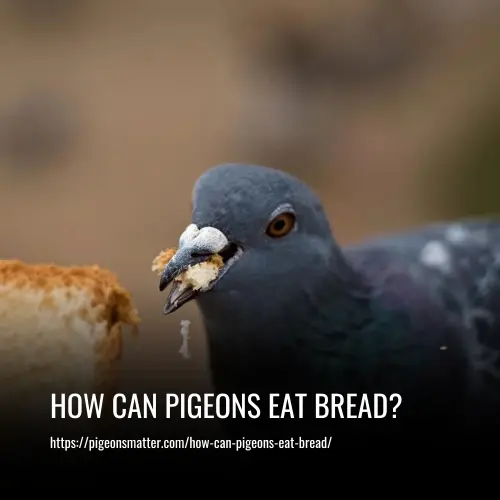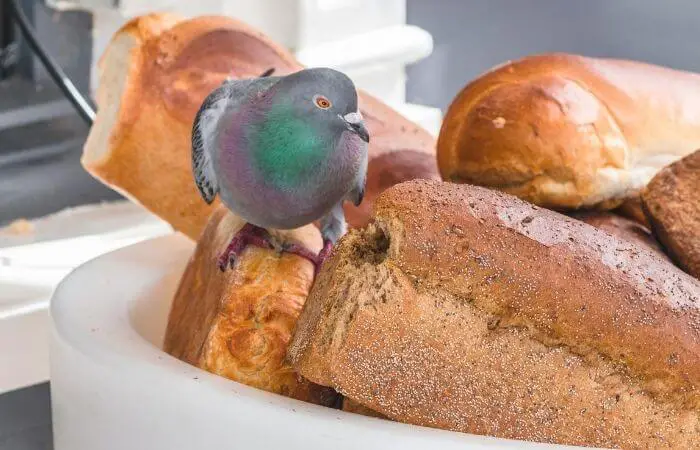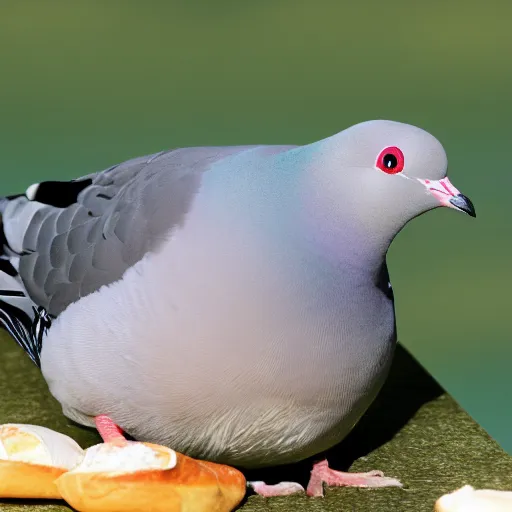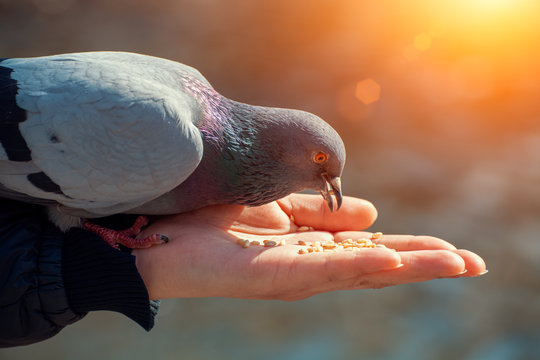How Can Pigeons Eat Bread?
This post contains affiliate links. As an Amazon Associate, we earn from qualifying purchases.
Bread is fine for pigeons to eat in moderation, but it should not form a major part of their regular diet. While not strictly bad for them in small amounts, filling up on bread may cause pigeons to miss out on the vital balance of nutrients needed from a more diverse range of healthier foods.
Therefore, it is best to offer pigeons a variety of healthier options in addition to bread to ensure they receive the necessary nutrients for their overall health and well-being.

Is Bread Good For Pigeons
Bread is not particularly good for pigeons. Here are some reasons why bread should only be fed to pigeons in moderation. Bread lacks important nutrients like protein, vitamins, and minerals that pigeons need to be healthy. It does not contain enough fat and protein to provide sufficient energy and can lead to malnutrition, obesity, and metabolic disorders.
Additionally, bread expands in the crop, leading to crop stasis, and wet bread can harbor molds and bacteria. Pigeons benefit from a varied diet of seeds, grains, beans, nuts, fruits, and some proteins. While bread isn’t directly toxic to pigeons, it doesn’t have enough nutritional value to be a healthy regular part of their diet.
The Nutritional Value Of Bread For Pigeons
Bread is primarily made up of wheat flour, yeast, water, and salt, containing carbohydrates, small amounts of protein, and trace amounts of vitamins and minerals. However, it is not a significant source of essential nutrients for pigeons.
When compared to a pigeon’s natural diet of seeds, fruits, and vegetables, bread falls short in terms of nutritional value. Pigeons require a balance of essential nutrients such as protein, fat, vitamins, and minerals, which bread does not provide sufficiently.
While bread is not harmful to pigeons in small quantities, large amounts can lead to health issues like obesity and malnutrition. Thus, it should be used as a treat and not the main source of food for pigeons.
How Do Pigeons Digest Bread
Pigeons have a high-powered digestive system that allows them to easily digest bread. When a pigeon swallows bread, it uses its beak and tongue to tear the food into smaller pieces and then it travels down the esophagus into the crop, where it is stored and moistened with saliva. From there, the food enters the proventriculus, where stomach acids break it down into a soupy mixture.
Next, the food moves into the gizzard, a muscular organ that grinds the food into a paste using small stones. The paste then enters the intestine, where nutrients are absorbed and waste products are excreted. Due to this efficient process, pigeons can turn a piece of bread into energy within just a few hours.
Do Pigeons Like Bread
Pigeons do enjoy eating bread on occasion, but too much bread is not suitable for their diet and health. If they become dependent on bread, it can cause problems. Nature provides nutritious food for pigeons, and they are adept at finding it.
However, if they rely too heavily on bread, they become reliant on humans and miss out on their natural diet. This goes against their natural instincts and may not be suitable for their overall health and well-being. Therefore, while pigeons may like bread, it may not be the best option for their diet.
Why You Shouldn’t Feed Bread to Pigeons
Feeding pigeons bread can be harmful to their health for several reasons. First, bread lacks essential nutrients and can quickly fill up a pigeon’s stomach, preventing them from consuming the proper amount of nutritious food. Furthermore, bread can pose a choking hazard and, if ingested, can expand in their stomach, leading to potentially fatal consequences.
Additionally, moldy bread can be toxic to pigeons, further highlighting the risks associated with feeding them this type of food. As such, it is important to refrain from feeding bread to pigeons in order to safeguard their well-being.
Risks For Pigeons Eating Bread
Pigeons, like many animals, may face several problems if they consume too much bread. These problems include expansion in their stomach, a lack of proper nutrients, and potential choking hazards.
1. Expansion in the Stomach
Bread is water-absorbent, and after a pigeon eats it, the bread may expand in its stomach. While pigeons do have a muscular, digestive stomach pouch, excessive expansion can harm them.
2. Lack of Nutrients
The nutrient value of bread is negligible, making it an unsuitable choice for a pet pigeon’s diet. Pigeons typically eat pellet-like foods that are small in size but sufficient in quantity and provide essential nutrients.
3. Choking Hazards
If pigeons eat bread alone and ingest a large chunk in one go, they may choke. This poses a potential risk of death to the pigeon.
4. Moldy Bread
Furthermore, bread can become moldy due to moisture, making it harmful for pigeons to consume.
It’s important to be mindful of the potential risks associated with feeding bread to pigeons, and to instead focus on providing them with a more nutritious and suitable diet to ensure their well-being.
Will Bread Make Pigeons Sick
Eating small quantities of bread will not normally make pigeons sick. However, excessive consumption of bread can cause health problems for pigeons. Crop stasis can occur due to indigestible bread slowing down digestion. Malnutrition can result from lack of proper nutrition from too much bread.
Metabolic disease can manifest as obesity, fatty liver disease, and diabetes from excess refined carbohydrates. Moldy bread can cause illness from mold toxins. Poor muscle and feather condition can be a result of lack of protein. Bloating and diarrhea can occur from spoiled bread sitting in the gut.
To avoid sickness, bread should be no more than 10% of a pigeon’s diet and fresh water should be available at all times. Any uneaten bread should be removed after 1-2 hours before it goes stale or molds.

Signs Of Illness From Too Much Bread
Pigeons are often fed bread by well-meaning people, but an excess of bread in their diet can lead to health issues. Look out for these signs that indicate a pigeon is unwell from too much bread:
If your pigeon is exhibiting these symptoms, it’s important to take them to an avian vet for a health check. Additionally, the diet should be reviewed, and a higher protein seed mix, grains, beans, greens, and a vitamin supplement should be provided. Any bread should be removed from their diet until the bird recovers. Taking these steps will help your pigeon regain their health and vitality.
How Much Bread Can A Pigeon Eat Safely
A pigeon should eat around 30-50g of food per day, with no more than 5g of bread. Bread should be less than 10% of the total food, ideally no more than 2-3 times a week. It’s safe for a pigeon to eat a few small pieces or crumbs of bread each day, but it should not be a substantial portion of their diet. Variety and moderation are key when feeding bread to pigeons.
Can Bread Hurt Baby Pigeons
Juvenile pigeons should not be fed bread due to their high protein requirements for growth, making bread nutritionally inadequate. Additionally, the soft texture of bread can cause crop problems and overload the chick’s digestive system. It is recommended to wean baby pigeons onto seeds rather than high carbohydrate bread to ensure a balanced diet.
While a small amount of bread crumbs can be given occasionally, it is important for babies to mainly consume pigeon-specific formula and weaning mixes to prevent any health issues. If raising an orphaned baby pigeon by hand, it is crucial to ensure they have access to a balanced diet and to avoid allowing them access to large amounts of bread.
Do Pigeons Need Grit To Digest Bread Properly
Yes, pigeons need grit to digest bread properly. Pigeons normally swallow small stones or grit to help grind and digest hard seeds in their crop, but bread is soft and does not require gritting. However, pigeons should always have access to grit for when their normal seed diet is provided, as it also provides calcium and trace minerals absent from bread.
Therefore, providing grit for pigeons is important for their overall digestive health, even when they are consuming softer foods like bread.
Will Pigeons Fill Up On Bread Instead Of Other Foods
Pigeons have a tendency to fill up on low-nutrition filler foods like white bread if they have unlimited access. This can result in them consuming less of their nutritious food in favor of the easily available bread.
Long-term, this can lead to malnutrition despite the pigeon eating a large quantity of bread. To prevent this, it is important to moderate their bread intake and supplement it with other higher quality foods.

Do Wild Or Feral Pigeons Eat Bread
Feral pigeons in cities have adapted to eating human foods, primarily subsisting on a diet of bread, chips, fries, sandwiches, and food waste scavenged from the streets. This unbalanced and unhealthy diet leads to poorer health outcomes for city-dwelling pigeons compared to their wild counterparts. Despite the negative health effects, feral pigeons are able to survive and successfully breed on such diets.
Is Bread Better Than Other Human Foods For Pigeons
Bread is a better option than high fat, high sugar junk foods for pigeons as it provides some carbohydrate energy and satisfies hunger. Other human foods like chips, chocolate, cookies, desserts, and fast food are empty calories lacking vitamins and minerals.
These junk foods can lead to various health dangers for pigeons such as liver disease from high fat, dehydration from high salt, toxicity from chocolate, destruction of red blood cells from onion and garlic, and low blood sugar from xylitol sweetener.
However, pigeons should ideally not rely heavily on human food at all and instead consume healthier options like seeds, grains, and legumes. These choices provide essential nutrients for their overall health and well-being.
What Kind Of Bread Is Safest For Pigeons
The safest breads for occasional feeding of pigeons are wholegrain breads, rye, multigrain, seeded breads, wholemeal breads, brown breads, and homemade breads. These options offer higher fiber, extra nutrients, less processing, and more vitamins, while avoiding preservatives and bleaching.
It is important to avoid breads with onion, garlic, nuts, and seeds, as well as moldy bread, as these can impact the birds’ crop emptying. Additionally, it is crucial to steer clear of bleached and sweetened commercial breads when feeding pigeons.
Can Pigeons Eat Bread Daily
Pigeons should not be fed bread daily. It’s recommended to only give them bread occasionally, around 1-2 times per week, and in small amounts. Daily feeding of bread can lead to malnutrition from vitamin and mineral deficiency, disinterest in healthier foods, crop emptying disorders, obesity, fatty liver disease, and poor muscle and feather condition without enough protein.
A pigeon’s diet should primarily consist of nutritious seeds, legumes, cereals, vegetables, and occasional fruits. Bread can be given as an occasional treat, but it is not a suitable substitute for proper pigeon nutrition.
Do City Pigeons Rely On Bread As Their Main Food
City pigeons have adapted to city environments where bread is a significant part of their diet, but this does not provide complete nutrition. Their reliance on bread is due to opportunism, the loss of native seed sources, and convenient feeding habits of people.
This dependence on bread is not ideal for their health and well-being, as they would benefit from a more balanced diet including mixed grains, seeds, greens, vegetables, and fruits.
The Pros And Cons Of Feeding City Pigeons Bread
Feeding bread to city pigeons has both advantages and disadvantages.
Pros:
– Convenient source of energy and calories for pigeons.
– Provides some sustenance in nutrient-poor city landscapes.
– Most pigeons appear healthy enough to breed.
– People enjoy feeding pigeons.
– Pigeons rely on this food source.
Cons:
– Nutritionally inadequate as a staple food.
– Can lead to obesity and related disorders.
– Promotes dependence of pigeons on humans.
– Can contribute to overpopulation of pigeons.
– Promotes pigeon pest activity some find objectionable.
– Better foods like seeds, legumes, and grains should be provided.
What Do Veterinarians Advise For Feeding Bread To Pigeons
Most avian veterinarians advise that bread can be fed to pigeons in moderation as an occasional treat, making up no more than 10% of their daily diet. It is important to ensure that a balanced pigeon seed mix remains the primary diet and to avoid feeding moldy bread, which can harbor toxins. Overly refined white bread should be avoided in favor of multigrain options.
Uneaten bread should be removed within 1-2 hours, and protein levels may need to be increased if bread is being fed often to compensate. Vets see many cases of crop stasis from excessive bread consumption, so moderation is key. Therefore, while it is allowed as a supplemental treat, bread should not be a major component of a pigeon’s diet.

Do Wildlife Rehabilitators Advise Feeding Bread
Most wildlife rehabilitators advise against feeding bread to wild or sick pigeons and birds. Instead, they recommend focusing on grains, seeds, greens, and vegetables for proper nutrition. If no other food is available, it is advised to soak hard bread in water to soften it.
However, it is crucial to never introduce bread to juvenile birds. While bread may be okay for larger, strong birds, it should not be given to debilitated patients. Wildlife rehabilitators also emphasize the importance of ensuring grit is available to aid in digestion.
FAQs
A healthy adult pigeon can eat about 20-25% of its body weight in food each day. This means that a pigeon that weighs 100 grams could eat about 20-25 grams of bread in a day.
If pigeons eat too much bread, they can become obese and have health problems just like humans. They may also develop diabetes and liver problems.
Pigeons can eat rice, both cooked and uncooked. While rice may not be the most nutritious option for them, it is safe for them to consume as part of a balanced diet. Wholemeal rice is a better choice as it offers more nutrients compared to white rice.
Yes, pigeons can get fat. They are known to be homebodies and spend a lot of time eating and sitting around, which can lead to weight gain. However, this is usually not a health issue for them as they naturally have high-fat diets and are efficient at fattening themselves up.
Pigeons do not have a specific favorite food, so they can eat a variety of foods. It’s best to provide them with a balanced diet that includes nuts, seeds, vegetables, and foods containing fat and protein. Nuts and fruits are especially good for their nutrition.
Instead of bread, you can feed pigeons bird food or minced vegetables like broccoli, edamame, carrots, cauliflower, lima beans, corn, and bell peppers. They also enjoy unsalted chopped nuts, sunflower seeds, uncooked popcorn kernels, and grains like rice, lentils, or quinoa.
Bread can be given to pigeons as a treat in small amounts, but it should not be a large part of their diet.
Feeding pigeons large quantities of bread can be harmful to their health. Bread lacks the essential nutrients that pigeons need in their diet, which can lead to issues like obesity and malnutrition. It’s best to avoid feeding them bread and provide them with a more balanced diet.
Moldy or spoiled bread can be harmful to pigeons and should not be fed to them. Mold can contain toxins that can make pigeons sick or even be fatal to them. It’s best to only offer fresh and healthy food to pigeons.
Feeding bread to pigeons in large quantities can cause digestive problems like bloating and diarrhea. It’s best to avoid giving them too much bread and instead feed them a balanced diet of birdseed or other appropriate foods.
Yes, bread can be given as a treat to pigeons, but it should only be given in small amounts. It should not make up a large portion of their diet.
No, bread is not a suitable food for breeding pigeons because it lacks the essential nutrients they need. It is important to provide them with a balanced diet to support their breeding and overall health.
Yes, you can feed bread to pigeons, but it should be done in moderation. While bread is not very nutritious for pigeons, they can still eat it because of their special stomach pouch. However, it is important to note that bread should not be their main source of food. Pigeons require a balanced diet that includes berries, vegetables, seeds, and other nutritious foods.
Conclusion
Pigeons can eat bread due to their natural ability to digest grains and seeds. While bread should not be the main source of nutrition for pigeons, it can be a suitable snack when offered in moderation.
It’s important to remember that pigeons thrive on a diverse diet that includes grains, seeds, fruits, and vegetables. Additionally, ensuring that the bread offered is whole grain and free from additives or preservatives can help reduce the risk of health issues for pigeons.
By understanding the natural diet of pigeons and providing them with a balanced and nutritious diet, we can help ensure the health and well-being of these resilient birds in urban environments.